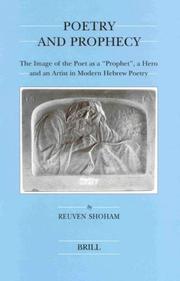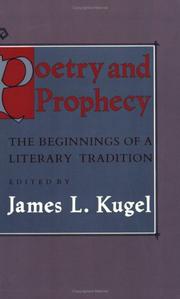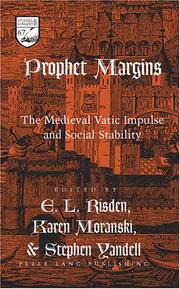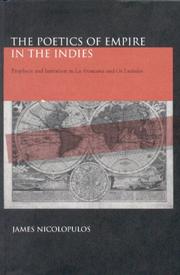| Listing 1 - 10 of 31 | << page >> |
Sort by
|

ISBN: 9004127399 Year: 2003 Publisher: Leiden Boston Brill
Abstract | Keywords | Export | Availability | Bookmark
 Loading...
Loading...Choose an application
- Reference Manager
- EndNote
- RefWorks (Direct export to RefWorks)
Book
Abstract | Keywords | Export | Availability | Bookmark
 Loading...
Loading...Choose an application
- Reference Manager
- EndNote
- RefWorks (Direct export to RefWorks)
Book
ISBN: 2600008306 9782600008303 Year: 2003 Volume: 21/1 Publisher: Paris Genève Droz
Abstract | Keywords | Export | Availability | Bookmark
 Loading...
Loading...Choose an application
- Reference Manager
- EndNote
- RefWorks (Direct export to RefWorks)
Time in literature --- Prophecy in literature --- European literature
Book
ISBN: 9788413404837 8413404835 Year: 2022 Publisher: Zaragoza: Prensas de la Universidad de Zaragoza,
Abstract | Keywords | Export | Availability | Bookmark
 Loading...
Loading...Choose an application
- Reference Manager
- EndNote
- RefWorks (Direct export to RefWorks)
Prophecy in literature --- Spanish literature --- Latin American literature

ISBN: 0801495687 Year: 1990 Publisher: Ithaca (N.Y.): Cornell university press
Abstract | Keywords | Export | Availability | Bookmark
 Loading...
Loading...Choose an application
- Reference Manager
- EndNote
- RefWorks (Direct export to RefWorks)
Mythology in literature --- Poetry --- Prophecy in literature --- History and criticism

ISBN: 0820471070 Year: 2004
Abstract | Keywords | Export | Availability | Bookmark
 Loading...
Loading...Choose an application
- Reference Manager
- EndNote
- RefWorks (Direct export to RefWorks)
Prophecy in literature --- Literature and society --- Politics and literature
Book
ISBN: 9781009366311 1009366319 9781009366274 9781009366298 1009366289 1009366300 Year: 2024 Publisher: Cambridge ; New York, NY Cambridge University Press
Abstract | Keywords | Export | Availability | Bookmark
 Loading...
Loading...Choose an application
- Reference Manager
- EndNote
- RefWorks (Direct export to RefWorks)
Since the mid-1700s, poets and scholars have been deeply entangled in the project of reinventing prophecy. Moving between literary and biblical studies, this book reveals how Romantic poetry is linked to modern biblical scholarship's development. On the one hand, scholars, intellectuals, and artists discovered models of strong prophecy in biblical texts, shoring up aesthetic and nationalist ideals, while on the other, poets drew upon a counter-tradition of destabilizing, indeterminate, weak prophetic power. Yosefa Raz considers British and German Romanticism alongside their margins, incorporating Hebrew literature written at the turn of the twentieth century in the Russia Empire. Ultimately she explains the weakness of modern poet-prophets not only as a crisis of secularism but also, strikingly, as part of the instability of the biblical text itself. This title is part of the Flip it Open Programme and may also be available Open Access. Check our website Cambridge Core for details.
Prophecy in literature. --- Prophecy --- Poetry --- Christianity. --- Judaism. --- History and criticism.
Book
ISBN: 9782600010832 2600010831 Year: 2008 Volume: 83 Publisher: Genève : Droz,
Abstract | Keywords | Export | Availability | Bookmark
 Loading...
Loading...Choose an application
- Reference Manager
- EndNote
- RefWorks (Direct export to RefWorks)
Agrippa d'Aubigné ou les misères du prophète explore les paradoxes qui s'attachent à la fonction prophétique. Parole absolue qui doit s'incarner dans les contingences de l'histoire, elle aliène son énonciateur, qui ne possède en général ni l'art, ni les prédispositions naturelles, ni l'envie pour en assumer la mission. Rêve de performativité et d'efficacité, le propos prophétique est avant tout le constat de son impuissance dans le présent, du rejet et de la suspicion qui caractérisent sa réception. Dans Les Tragiques, Aubigné estime la mission de sa parole à l'aide de figures, telles que celles de Jonas et Jérémie, exemplaires d'un prophétisme conçu sur le mode du tourment. La complexité de l'èthos prophétique albinéen se nourrit en outre de la place problématique qu'occupe le prophète dans l'ecclésiologie protestante, position vide qui ne laisse plus guère de champ qu'à des postures, comme le montrent les écrits de Luther, Calvin et Zwingli. Un problème de reconnaissance affecte le prophète, au point d'en devenir probablement une des caractéristiques intrinsèques. Si Agrippa d'Aubigné intègre cette donnée dans sa propre énonciation, il est remarquable que cette dernière perturbe aussi le discours critique sur son « prophétisme » dès la première réception des Tragiques au XIXe siècle.

ISBN: 0271019905 Year: 2000 Publisher: Pennsylvania State University Press
Abstract | Keywords | Export | Availability | Bookmark
 Loading...
Loading...Choose an application
- Reference Manager
- EndNote
- RefWorks (Direct export to RefWorks)
Imitation in literature. --- Prophecy in literature. --- Ercilla y Zúñiga, Alonso de, --- Camões, Luís de,
Book
ISBN: 585694030X Year: 1995 Publisher: Sankt-Peterburg : KĖM,
Abstract | Keywords | Export | Availability | Bookmark
 Loading...
Loading...Choose an application
- Reference Manager
- EndNote
- RefWorks (Direct export to RefWorks)
Death in literature. --- Poets, Russian --- Poets, Russian --- Prophecy in literature. --- Death. --- Prophecies.
| Listing 1 - 10 of 31 | << page >> |
Sort by
|

 Search
Search Feedback
Feedback About UniCat
About UniCat  Help
Help News
News